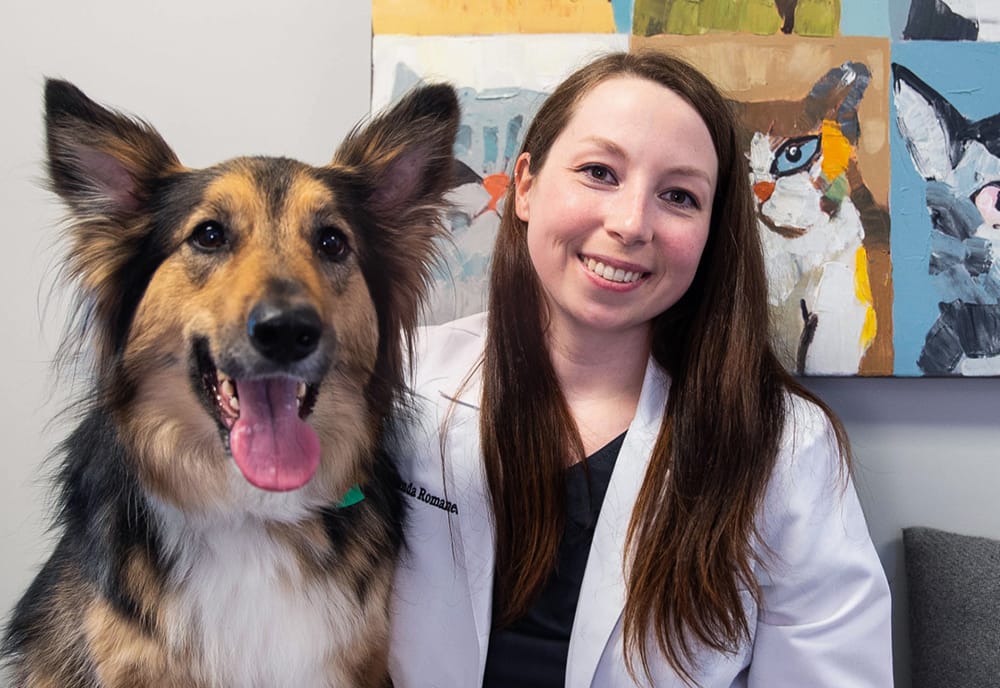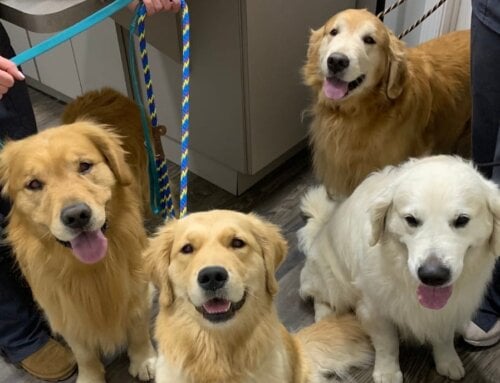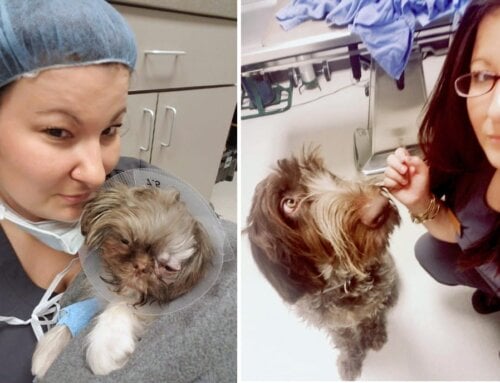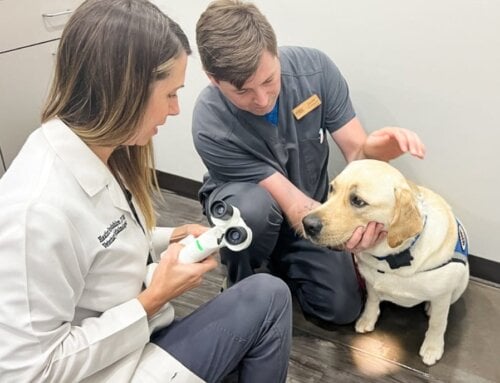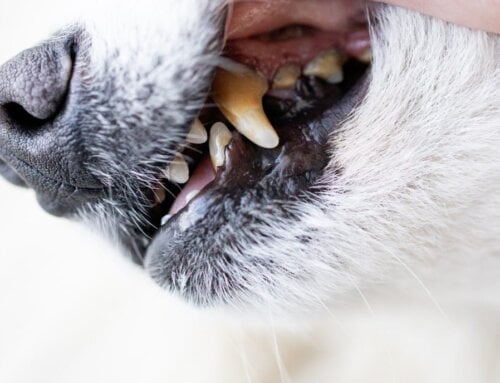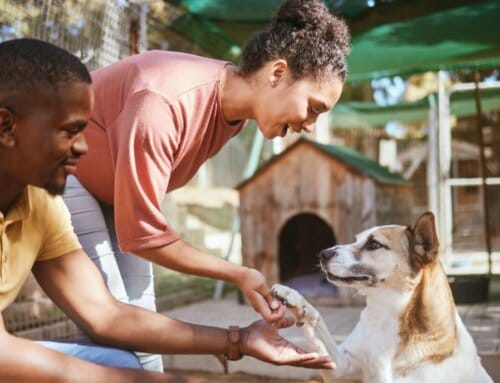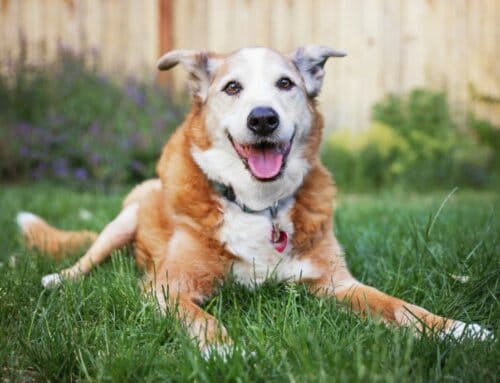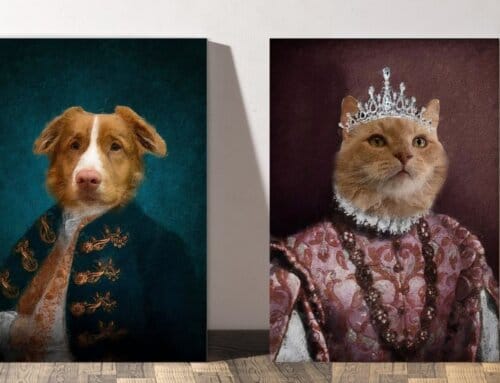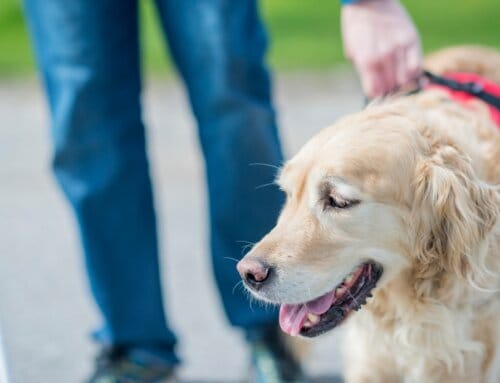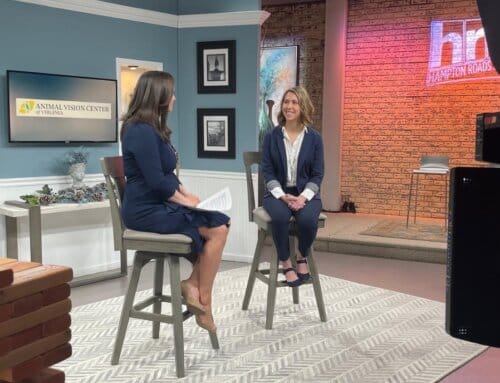It was a college lecture that first drew Dr. Amanda Romaneck into the field of veterinary ophthalmology, and she’s been learning, teaching—and now practicing—ever since. As a specialty ophthalmology intern (and soon-to-be resident) with Animal Vision Center of Virginia, she assists Dr. Heather Brookshire with patient exams and surgeries, participates in the practice’s online “rounds” series with general veterinarians, and will undertake a research project involving nutrition’s role in improving ocular health.
The fast pace of the internship is just fine with Dr. Romaneck; she’s accustomed to having a busy schedule. She logged untold hours earning a Bachelor of Science degree in biology from Northern Illinois University, a Doctor of Veterinary Medicine degree (DVM) from the University of Missouri, and a one-year rotating Medicine and Surgery internship with Iowa State University before joining Dr. Brookshire’s team. Now, she’s enjoying her work; life in Virginia Beach; and a break from the chilly Midwest weather, as you will read in this In Focus feature.
What drew you to the field of animal ophthalmology?
A big part of why I entered the field of veterinary ophthalmology is because of the passion and enthusiasm of the ophthalmologist that first introduced me to the world of eyeballs. This sounds grand, but her enthusiasm was contagious. During that first lecture, I found myself transfixed. While all my lectures were important, I realized I could not get enough. Later in my didactic training, that same feeling happened with each ophthalmology lecture, and I knew that I wanted to grow up to be an ophthalmologist, just like her. The other ophthalmologists that taught me during my didactic and clinical training also nurtured this desire to be an ophthalmologist and helped me get to where I am today.
Another reason why I was drawn to ophthalmology is just that eyes are super cool! Each animal has their own special set of eyes, and the differences and similarities are just something I find beautiful.
Describe a typical day at AVCVA.
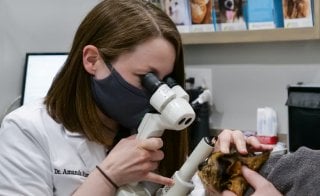 My mornings typically involve assisting Dr. Brookshire during her exams by ensuring each pet’s medical record is updated to reflect their progress with each visit. In the afternoons, I see patients for new and recheck exams as the primary doctor on the case, with direct mentorship from Dr. Brookshire. If these pets require any minor procedures during their visit, I perform those with the help of our excellent technicians and assistants. On our surgical days, I assist with getting our patients ready for their surgeries, help with anesthesia administration and monitoring, as well as perform extraocular surgeries.
My mornings typically involve assisting Dr. Brookshire during her exams by ensuring each pet’s medical record is updated to reflect their progress with each visit. In the afternoons, I see patients for new and recheck exams as the primary doctor on the case, with direct mentorship from Dr. Brookshire. If these pets require any minor procedures during their visit, I perform those with the help of our excellent technicians and assistants. On our surgical days, I assist with getting our patients ready for their surgeries, help with anesthesia administration and monitoring, as well as perform extraocular surgeries.
Have there been any surprises or discoveries about your intern experience so far?
Coming from a rotating internship in an academic setting to a faster-paced private practice setting, I was initially hesitant to think that I would fit in with such a change. Since starting this internship, I was surprised with how much I enjoy being in a private practice and I think it is because Dr. Brookshire has made a program that encapsulates the best of both worlds.
One of my biggest hesitations was the fact that teaching is a large part of academia. However, I have so many opportunities to teach others, and one of my favorite examples is our regular ophthalmology rounds we put together for our referring veterinarians. Even though it is over Zoom, it is still awesome to be able to talk about eye diseases with our general practitioner counterparts.
The other aspect that I really enjoy is just how many clients and pets we see on a regular basis. There is always something happening in the clinic that just has a good energy to it different from academia that I really like.
What do you find fulfilling about teaching, and has working at AVCVA allowed you to gain more experience in this area?
Teaching others is something I am very passionate about. I find it rewarding to see concepts click with people and be able to apply that knowledge for themselves. At an academic institution previously, a large part of my job was to teach future veterinarians and help them learn through their cases. Here at AVCVA, I have been able to continue to teach with my target audience being my clients. Our version of curbside medicine has certainly made that experience easier as well. In addition to our clients, we have had students and visiting veterinarians join us to learn more about veterinary ophthalmology. These were times when I could not pass up a chance to ask an eyeball question or two to test their knowledge.
Finally, our excellent support staff is always eager to learn more about the fine details of ophthalmology, or at least they put up with me talking all about it.
You are planning a research project. What will this involve, and how will the research be used?
I have been interested in nutrition’s role in improving ocular health for some time. My research will focus on assessing how effective the nutritional supplements we have in veterinary ophthalmology improve ocular health and prevent/slow disease progression. Literature on supplements, in general, is limited in both physician and veterinary research. Initially, this will involve assessing how a widely used ocular supplement prevents or slows retinal atrophy, or degeneration, with electroretinography to objectively measure this intended function. I am hopeful that this information will lead to further assessment of these supplements so we can provide our pet patients with the best recommendations.
How do you enjoy spending your down time?
I spend a good bit of my time just relaxing at home with my husband and our two pets: Dovah, our fluffy pup, and Kiin, our cat. Both turned five this spring and are growing up so fast! Kiin finds the Virginia sunshine to be just right to sit by the window and show off his bow ties, and Dovah has gotten to explore some of the parks around town and is getting used to the beachy vibes.
My husband and I are avid gamers and will chill at the end of a busy day with some videogames. It is also our way of keeping in touch with our friends back home and across the U.S. I also enjoy sewing, crafting and baking various sweets for family and friends. On weekends that are a bit warmer, I will sometimes hit the beach for some sunshine or Dovah and I will explore the parks of Virginia Beach.
Do you have any advice for veterinary students who may be considering this specialty field?
Veterinary ophthalmology is a competitive specialty in an already competitive field of medicine and getting here takes a lot of hard work and determination. However, once you find that career that really speaks to you, whether it is ophthalmology, general practice, or emergency medicine, the effort becomes worth the reward of loving what you do. If ophthalmology is what speaks to you, know that it is competitive, and you may have to keep applying to get to that next step even if it feels like that next step won’t come. It will if you keep fighting for it.
